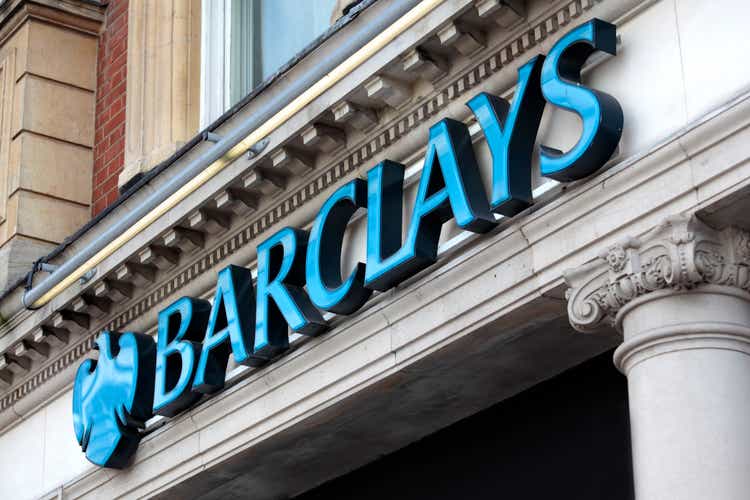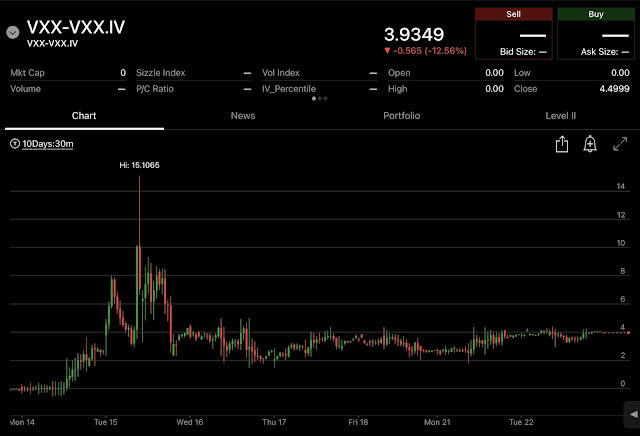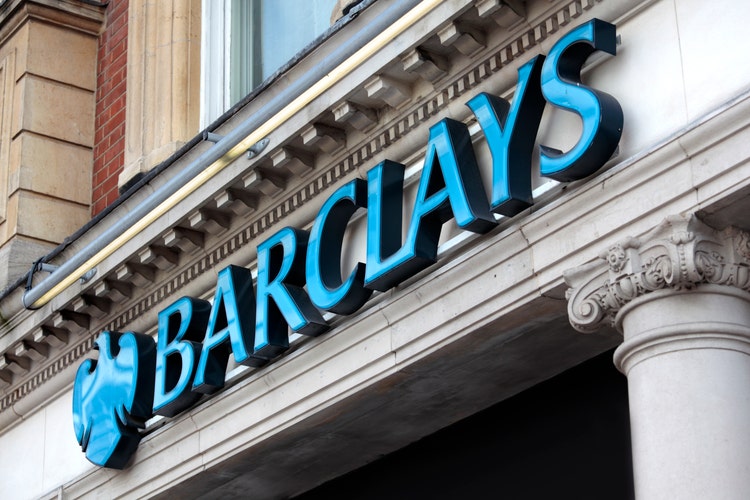[ad_1]
hatman12/iStock Editorial via Getty Images
Originally published on March 22, 2022
One week ago, Barclays announced the suspension of issuance of new creation units as well as sales from inventory for two of its ETNs: the iPath Series B S&P 500 VIX Short-Term Futures ETN (BATS:VXX); and the iPath Pure Beta Crude Oil ETN (OIL).
The purpose of this post is to explain the risks for both long and short holders of VXX and to get a sense of how this story is likely to play out.
First of all, the announcement came before regular trading hours on March 14th, and during the entire session, VXX traded at a premium of up to 3.28 points relative to its intraday indicative value (IV), as captured in a graphic in Barclays Suspends Creation Units for VXX. By the end of the day, VXX was trading at a 1.73 point premium to indicative value – which is what VXX would be trading at if new creation units were still enabled.
It wasn’t until March 15th that the fireworks begin. That morning, VXX opened up another 2.08 points at 30.89, up 6.7% from the previous day’s close. Right from the open, there was some intense buying pressure that resulted in a short squeeze, with VXX briefly spiking as high as 41.65, up 44.6% from the previous day’s close. That short squeeze was retraced over the course of the day, and by the end of the session, VXX was down 0.11 on the day. The action during the last five days has been relatively uneventful, though the volume in VXX has dropped approximately 90% from a pre-suspension average of about 50 million shares per day to less than 5 million today. As of today’s close, VXX was at 25.44, some 3.93 points (15.4%) over indicative value.
The chart below captures the journey of VXX relative to indicative value (VXX.IV) in the seven days going back to the original announcement of the suspension of new creation units. Note that for the last week, the VXX premium is relative to VXX.IV has been in a range between 1.50 and 5.00, with that early short squeeze premium of 15.11 now firmly in the rear-view mirror. At various times it appeared that traders had settled on 3.50 or 4.00 as an appropriate amount of premium for VXX in the absence of new creation units that could be used to arbitrage the price of VXX back down to VXX.IV.
The big questions are what to expect going forward and what are the risks to both long and short holders of VXX. At the risk of stating the obvious, nobody outside of Barclays knows what will happen going forward, but Barclays described their move as a temporary suspension of creation units. With VXX having assets of $729 million and a fee of 0.89% per year, Barclays has an incentive to find a solution for the creation units problem – and whatever is behind it – so that they can collect their $6.5 million annual fees from this product. Credit Suisse was able to resolve a similar problem with the suspension of TVIX new creation units in a month and a day back in 2012. Barclays and VXX have been at this game longer than anyone else, with an initial launch of VXX back on January 30, 2009. They have had 13 years to prepare for the present situation, which is likely a least partly related to hedging risks and costs associated with how Vladimir Putin proceeds with the invasion of Ukraine. I expect they will find a solution to the new creation units problem in relatively short order, but I have no insight into whether this will be a matter of days or weeks.
Going forward, both longs and shorts have to expect that Barclays will bring VXX creation units back, and when they do, the VXX premium relative to VXX.IV is likely to disappear almost instantly. Truth be told, when Credit Suisse brought back creation units in TVIX back in 2012, it took two days for most of the indicative value premium to be wiped out, but those days were excruciating losses of 29.3% and 29.8% that left investors reeling and confused. This time around the premium at risk of another new creation units air pocket is “only” 15.4% — but there is very little to prevent this number from growing much larger.
This brings us to the other side of the equation. How much higher can a short squeeze take VXX? While 90% of the daily volume in VXX has evaporated in the past seven days, the current 5 million shares per day will likely have to shrink considerably more before a short squeeze has much in the way of potential staying power. The DGAZ story from 2020 is a stark reminder that not only is it theoretically possible to see a spike of 12,000%, but such a spike has recently happened. The problem for longs is that, in waiting for a potential short squeeze, each day brings them one day closer to the seemingly inevitable announcement of a restoration of creation units and a 15.4% contraction in the price of VXX. In addition to that potential 15.4% haircut, long holders should also keep in mind that VXX has lost an average of 56% per year going back to 2009 due to structural weaknesses such as contango, negative roll yield, and daily compounding decay (which I have summarized in posts such as Four Key Drivers of the Price of TVIX), so time is not on the side of VXX longs.
In summary, the risk for shorts is the potential for a successful short squeeze along the lines of the DGAZ fiasco. As volume in VXX decreases, which is likely to be the case until Barclays resolves the new creation units issue, the risk of a short squeeze rises. On the other hand, the risk for longs is the resumption of new creation units almost immediately wiping out the premium over indicative value. Both longs and shorts are likely to see their risks go up over time. For VXX longs, the assumption is that volume will continue to go down over time, increasing the risk of a short squeeze. For VXX shorts, the risk is that a solution to the creation units problem is just around the corner and could be announced at any time. An announcement is unlikely to come out during the trading day, but overnight risk should be treated as considerably higher than intraday risk.
This situation is exactly the type of “jump risk” (or gap risk) that makes options an attractive way to structure a trade – either on the long or short side. That said, note that implied volatility in VXX options is presently at an elevated level of 102, making outright purchases of VXX puts and calls expensive in the current environment.
I should note that VXX long holders may also be subject to acceleration risk, which means that this product is subject to early redemption or an “accelerated” maturity date, at which point the ETN would be redeemed at indicative value (VXX.IV) not at the current market price. For more information on the risks associated with ETNs, FINRA has a good summary of the issues.
Last but not least, I should mention that the OIL ETN that had its creation units halted at the same time as VXX has seen very little in the way of premium over indicative value, with the biggest exception being a smaller squeeze/spike on the second day that coincided with the big spike in VXX. Right now, the premium in OIL is a mere 0.03. This does not mean that the Reddit wallstreetbets crowd will not suddenly pile into the OIL trade in an effort to squeeze the shorts in a lower volume name, but so far at least, the WSB crowd does not see OIL in the same way they saw the VXX or Opportunity of a Lifetime trade.
So, whether you are long or short VXX, understand the risks associated with your position and the time and volume factors also at work. For those who insist on trading this name, consider structuring positions as defined-risk options trades.
In the graphic below, I show the premium of VXX to VXX.IV over the course of the last seven days, using 30-minute bars.
Yahoo, TD Ameritrade, VIX and More
Disclosure(s): Net short VXX at time of writing
Original Post
Editor’s Note: The summary bullets for this article were chosen by Seeking Alpha editors.
[ad_2]
Source links Google News

